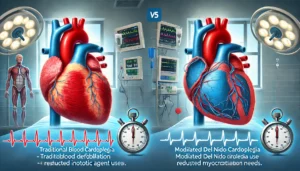
Gradual Oxygen Exposure During Coronary Bypass for Acute Myocardial Infarction: A Retrospective Cohort Study
This study examines the impact of gradual oxygen exposure during emergency coronary bypass surgery for acute myocardial infarction (MI). A retrospective cohort of 66 patients was analyzed, comparing outcomes between those receiving venous blood cardioplegia with controlled oxygen exposure and those undergoing standard hyperoxic procedures. The findings indicate a significant reduction in mortality, improved ventricular function, lower readmission rates for heart failure, and reduced need for defibrillators.










